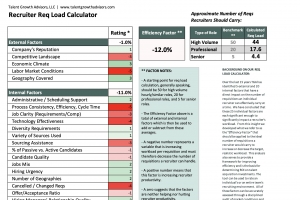Four Essential Reasons Why HR Doesn’t Have a Seat at the Table

It's a communication drumbeat we've heard for years . . . HR's complaint that they don't have a seat at the table. There's nothing new about it. In fact, there are only three things worth noting about this now-predictable gripe:
1) Only HR is complaining - not the other groups who are already at the table.
2) The purpose of HR being at the table isn't clear; it's unknown (even to HR?) what will they contribute or deliver if they ever get there.
3) Until it's clear why HR isn't at the table, and solve for those issues, they'll never get there.
HR's absence during critical business discussions, decisions and events lies in the function's inability to measure their plans and efforts. In turn, HR's inability to perform in this way hampers companies' efforts to measure the effectiveness of their talent investments. Think about it: what other part of the business allows enormous investments of any kind (e.g., in equipment, technology, etc.) without a detailed business case, including the predicted return on the investment, and a robust debate about the need and possible solutions. Yet every day, companies sink untold dollars in hiring, training, retention and engagement efforts without any expectation that such investments will be objectively and meaningfully evaluated.
There are several reasons for the fundamental flaw in the way companies measure the effectiveness of their talent efforts - and much of it lies within the Human Resources function, according to a number of studies, including a joint McKinsey/Corporate Executive Board 2012 paper called "The State of Human Capital: False Summit".
After considering this research and our own experience, we've identified four essential reasons why measurable progress related to talent management efforts, outcomes, and predictability has been limited and, in turn, why HR is essentially barred from "the table". Behind each of these headings is a story about how we've gotten to this place - and clues about what can be done to turn the ship around.
1. Lack of HR Credibility
Many corporations have few, if any, strategic positions dedicated to HR. The demands placed on HR aren't financial or analytical in nature because companies don’t position the function as such. Overwhelmed with personnel-related administrative responsibilities - and few demands tied to strategy or measurement - individuals in HR roles are viewed as having low “authority.” In turn, this causes them to struggle establishing credibility, assessing strategic opportunities, and driving results-based change.
2. A Support Function Mindset
When jobs are tactical in nature, they appeal to people who like tactical work. Many HR professionals, when surveyed, report a preference for administrative, nonstrategic work. They often have a low tolerance for risk and a limited sense of what they care to “own” or have authority over. Studies such as New Talent Management Network's 2013 State of Talent Managers Report indicate that HR professionals have a lack of confidence in their own skills and abilities, which leads (in general) to choosing administrative work over more strategic, analytical career opportunities. It’s not a leap to tie these results and conclusions to another data point: Only 32% of HR leaders have high confidence in their own strategy or actions.
3. Skill and Capability Gaps
Here is where it all comes full-circle. Nonstrategic, administrative jobs attract tactical-minded people who prefer more rote, task-driven work. Couple this with the bona fide difficulty of obtaining accurate, people-related data (that is, measurements related to quality of hire, cost of attrition, ROI of learning investments, and so on) and you’ve got a lack of data-based decision-making and forecasting that impedes the driving of change. These leaders are unable to gather and use data to create business cases and, in turn, build a “burning platform” for significant changes or investments in their company’s talent strategy.
4. Limited Aspirations
To further illustrate the reason HR lacks strategic leadership and analytical skills, consider these other findings from the “State of Talent Managers Report”:
- Most HR incumbents are in the function because they want to help people.
- Only 18% aspire to be CHROs.
- Sixty-eight percent consider themselves to be “top performers” yet . . .
- Sixty-nine percent stated they have only a “slight” understanding of their company’s business.
This survey data indicates that, as mentioned in its conclusions, HR professionals’ aspirations are measured, and their preference is more humanistic than capitalistic. Simply put, their love for and interest in people outweighs their love for and interest in the business.
So although "HR Transformation" efforts have led to new org designs and the implementation of advanced HR technologies, the evidence points to HR talent itself being the biggest barrier to true transformation. The predominantly administrative skills and attributes that served HR practitioners well in the industrial age of old are now obsolete. The new skills in defining and leading change, guided by a clear understanding of how value is created for the business, are still nearly absent. That is the urgent challenge in looking forward for businesses - and it's a time bomb for the HR function.
Wanted to learn more about fixing HR's credibility? Pre-order our new book: Talent Valuation: Accelerate Market Capitalization through Your Most Important Asset. You may also want to read our blog about The Future of HR.
Share this Article
Learn more about our unique approach to Talent Strategy Formulation.



